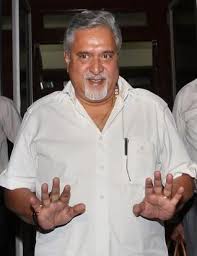
Bloomberg :Anto Antony - Feb 13, 2013 12:21 PM GMT+0530
Indian lenders to grounded carrier Kingfisher Airlines Ltd. will start the process to recover as much as 85 billion rupees ($1.6 billion) of dues after owner Vijay Mallya failed to pay the debt, the biggest creditor said.
“We have decided to start recovery process on the loans to Kingfisher,” Shyamal Acharya, deputy managing director of State Bank of India, said in an interview to Bloomberg TV India today. “Banks have already given Mallya enough time to repay.”
State Bank of India has set aside the 15 billion rupees it lent to Kingfisher following Mallya’s inability to pay the debt. Liquor tycoon Mallya in November 2011 pledged to raise money through new loans, a rights offer and property sales to pay debt and avoid grounding of the carrier. Kingfisher Airlines stopped operations 11 months later.
Remedies for the lender “include, going to the Debt Recovery Tribunal, enforcing pledge of movables,” said Rabindra Junjhunwala, Mumbai-based partner at law firm Khaitan & Co. The law also “gives certain classes of secured creditors additional remedies, such as attachment and sale of the secured assets of a borrower, taking over management of defaulting borrower.”
Kingfisher Airlines fell 2.3 percent to 10.85 rupees at 12:16 p.m. in Mumbai after dropping as much as 5 percent. The shares have plummeted 60 percent in the past year. United Breweries Holdings Ltd., which owns stakes in Mallya’s six companies, plunged 6.1 percent to 73.25 rupees, the lowest since July 4.
McDowell Holdings Ltd. fell 4.7 percent to 61.2 rupees. Mangalore Chemicals & Fertilizers Ltd. advanced 7.3 percent to 35.85 rupees, while United Spirits Ltd., which is being acquired by Diageo Plc, dropped 1.3 percent to 1,932.4 rupees.
No Operations
Prakash Mirpuri, spokesman for Kingfisher Airlines, declined to comment on the lenders move to start the process to recover dues.
The carrier reported a net loss of 7.55 billion rupees in three months ended Dec. 31 compared with 4.4 billion rupees a year earlier, exchange filings show. The carrier didn’t have any sales from operations, compared with 13.7 billion rupees a year earlier after suspending operations from Oct. 1.
Kingfisher has also defaulted on payments to fuel suppliers and airports as losses widened amid rising fuel costs and price competition.
Kingfisher, which was No. 2 in India by market share in 2011, has debt of 85 billion rupees, according to data compiled by Bloomberg.










